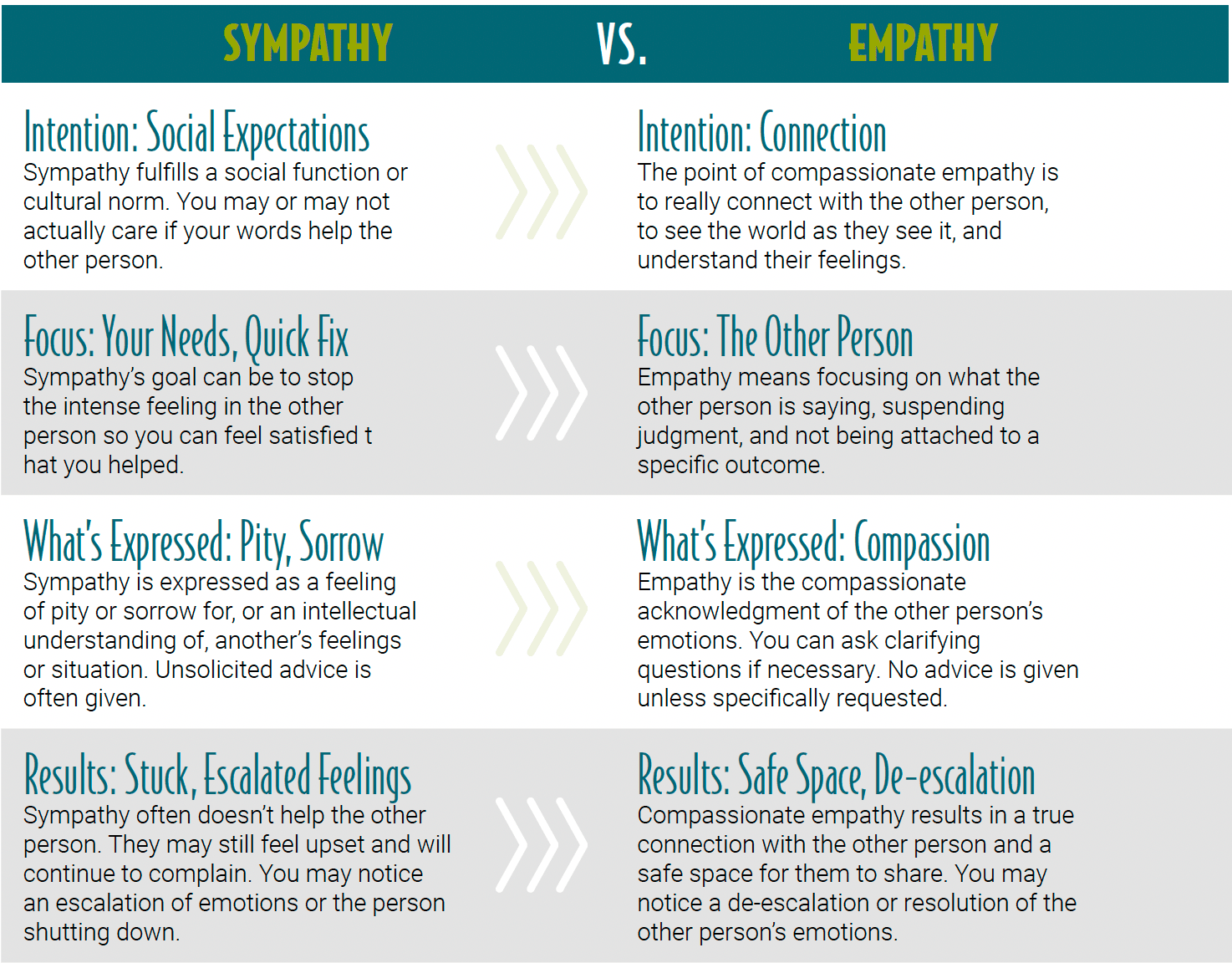It happens every day: Someone talks to us about a challenge they’re facing. Perhaps a relative is sick, or their child got in trouble at school. Maybe their car needs an expensive repair, or they are lamenting about an argument they had with their spouse. Whatever the challenge, you might be at the receiving end. Do you know how to respond with empathy? And which is better: sympathy or empathy?
Estimated reading time: 10 minutes

Table of Contents: read the whole article or jump to what you want to know!
How Is Empathy Different from Sympathy?
Sympathy Versus Empathy Examples
Which Is Better: Sympathy or Empathy?
Empathy Infographic
The Difference Between Empathy and Sympathy
Empathy Definition
Why Is Empathy Important?
Sympathize Versus Empathize: How to Respond with Empathy instead of Sympathy with examples
Empathy Requires Practice
To Summarize, Empathy Is...
3 Tips to Know If You're Being Empathetic
Tips to Show Empathy Effectively
How Is Empathy Different from Sympathy?
Expressions of sympathy fulfill a social function. It’s a cultural norm to tell a person facing difficult circumstances that you’re sorry about their situation. And that may be completely appropriate, and it may be all that you need to say at the moment.
At another level, though, the motivation for expressing sympathy may be an attempt to avoid uncomfortable feelings or prove to yourself and others that you are a caring person. In either case, a motive could be to “fix” the other person’s feelings, so you just don’t have to deal with them. That’s comfortable for you, but not very useful to the other person.
Sympathy seeks to make the other person feel better, even when we ourselves aren't particularly interested in what they have to say.
Empathy cares without taking on the person's emotions.
Sympathy Versus Empathy Examples
Why is sympathy limiting—sometimes it just doesn’t work. The feelings don’t go away. The person you’re trying to help with sympathy is just as stuck as ever. And isn't the point to help the person feel understood? Here are a couple of everyday examples:
 Example #1: A co-worker regularly comes into your office and interrupts your work. She spends half an hour reviewing the latest office chatter and has a habit of personalizing everything anyone says, turning the most mundane comment into a personal assault. You listen much longer than you would like to, hashing through the minutiae and trying to reassure her, even though you find the conversation repugnant. You secretly resent her for devouring your much needed time to get your work done.
Example #1: A co-worker regularly comes into your office and interrupts your work. She spends half an hour reviewing the latest office chatter and has a habit of personalizing everything anyone says, turning the most mundane comment into a personal assault. You listen much longer than you would like to, hashing through the minutiae and trying to reassure her, even though you find the conversation repugnant. You secretly resent her for devouring your much needed time to get your work done.
Nothing is going to change as a result of the conversation; you are just two people talking at each other. And sure enough—three days later she’s back with the same complaints. She simply has no boundaries!—and the entire time you are (half) listening (or sympathizing), all you are thinking about is how you can get out of the conversation.
Example #2: Six months ago, one of your best friends was the maid of honor for a friend from high school, whom you know slightly. Your friend went all out to help the bride—she even canceled a planned vacation in Mexico so she’d have more free time to help with the wedding. The bride hasn’t called your friend since the reception, or even sent a thank-you note for all her help.
Your friend is very hurt and completely obsessed about being ignored, and she complains about it every time she sees you. You’ve tried offering her sympathy, but lately you’ve started to just change the subject as quickly as possible. (Sound familiar?) Whatever the reason, your friend clearly is not getting over this.
You were sympathetic, right? So why didn’t your sympathy work? Why do these people still have the same feelings?
Hint: Unknowingly, people complain or repeat themselves when they are not feeling heard. (See the answers and empathetic responses for these scenarios where you see the hearts later in the article.)
It takes more than sympathy to make someone feel heard. The word for that “something more” is empathy. Empathy is the most powerful change-maker in all situations, in all relationships.
For the empathetic response for the above scenarios... keep reading!
Which Is Better Sympathy or Empathy?
Empathy has been one of my passions for decades, and I've been an emotional intelligence coach for almost as long. However, I had one of my most insightful experiences not that long ago, almost by accident.
I was at a large food chain restaurant having dinner by myself after a day-long training session with a corporate client. A charming and efficient young waitress brought my order, and as I enjoyed my soup I watched her waiting on the people at the next booth.
They were a young family, parents and two children. I was struck by how attentive the waitress was to the children’s needs and wishes. (“You’re right—the chocolate cake that man is eating does look really delicious.”)
However, what was outstanding was the way she also honored the role of the parents. (“Please let me know if you want to see the dessert menu later. We have children’s portions too.”) And after the children asked for a Coke and a strawberry sundae, she turned to the parents and asked, “Is that okay with you?”)

A few minutes later the waitress came to refill my water glass, and I complimented her on the way she handled the family. “You are very skillful at working with people. Good thing—you must have to deal with so many types of people, even in just one shift.”
She took a quick glance around at her tables. Everyone had their meal and was digging in. She turned back to me. “Could I sit down with you?” she asked. I was surprised, to say the least. “Well, sure,” I said. “I don’t want you to get in trouble, though.” She said, “No, it’s OK,” and plunked the water pitcher on the table across from me as she sat down.
Out poured a detailed account of her life. In under ten minutes, she had told me about her best customers, her worst customers (“You wouldn’t believe how badly people treat me sometimes!”), her stressful relationship with her parents, her volunteer work with the Red Cross . . .

She excused herself to check on her other tables, while I mused on the open window into her life that she had offered me.
Another few minutes passed, and she was back, nestling into my booth again. She went even deeper in the second conversation. The more I listened empathetically, the lighter and more energetic she became. She thanked me for listening and was gone.
Now, I know what you may be thinking: “I don't want complete strangers dumping their life story on my lap!”
And you may think that a conversation like that could be burdensome. But empathy just lightens the way for the other person, without you taking on any of the weight. And if I had felt I wasn’t in the mood or didn’t want to listen, I wouldn’t have engaged the waitress in the first place.
Empathy needs to begin with ourselves!
That waitress probably didn’t know what empathy is—I certainly didn’t tell her—but the minute she felt it, she was addicted to it, and came back for more.
Even if people don’t know what empathy is, when they get a taste of it, they want more.
I thought about this experience on the long drive home. What exactly had happened?
My responses were simple. I didn’t offer her sympathy. I didn’t say that I knew how hard it must be to keep the customers happy, or how heavy those trays are and how much her feet or her back must hurt. I didn’t say, “Yeah, I was a waitress once and I know how it is.”
I just observed her and paid her a sincere compliment on her work—her real work, not just taking orders and bringing people their food, but creating a happy experience for everyone she served. So she knew that I saw her as a person, not just as someone who waits tables for a living. She relaxed into the welcoming space created by my encouraging comment. She was hungry to be seen.
And when she came back a second time, it wasn’t because of a simple compliment, it was because my empathetic responses about her experiences had helped her feel heard and created a meaningful connection. And even though this waitress might not have realized it, she was also using empathetic responses to connect with the family that she was serving.
I call that the magic of empathy.
Related reading: "The Three Kinds of Empathy: Cognitive, Emotional, and Compassionate."
The Difference between Empathy and Sympathy
The difference still might not be clear and you may still be wondering: "Is empathy the same as sympathy?" So here are some more notes to help you distinguish between them.
It’s common for people to think they’re empathizing when they’re reacting with sympathy. Sympathy is not “bad” or “wrong.” It is valid and natural in many situations, but here is the crux of the matter: Sympathy does not create connection, healing, or resolution.
If someone tells you about their pain or misfortune and you think, “Uh-oh! They’re upset! I’ve got to do something to make them feel better,” you are reacting, not responding.
Sympathy is a feeling of pity, sorrow for their feelings or their situation, or an intellectual understanding of their experience. And many times it is a desire to stop the intense feeling in the other person so you can feel good because helped them feel better, and possibly so you don’t have to be unsettled or saddled by their feelings. Sympathy is often rooted in you and your feelings.
The responses are essentially focused on YOU.
If you are stuck in sympathy, the other person will remain stuck too. Their feelings won’t change, and the distance between you will remain—at times the gulf even increases.
What is empathy? Relative to sympathy, it is much more a felt thing. We often consider feelings (especially negative feelings) as messy, indulgent, weak, or overwhelming. It’s understandable that empathy is less often practiced than sympathy.
If you react to someone else’s emotion by thinking, “Hmmm . . . This person is upset! How can I create a compassionate space for them and for what they’re feeling?” you are headed for empathy.
 Empathy Definition
Empathy Definition
The basic definition is the ability to understand and share someone else’s feelings. Empathizing is putting yourself inside the felt experience of another person. It is feeling and understanding another’s emotions (without taking them on as your own or reacting inside yourself).
Why Is Empathy Important?
Empathy creates understanding, connection, and resonance with the emotions of someone you interact with, resulting in greater closeness and resolution. If the person has conflicting emotions, you are the tuning fork that allows them to return to coherence within themselves.
It’s essential to listen without immediately offering advice. When you allow someone to speak freely, you give them the space to explore their thoughts and feelings, empowering them to reach their own conclusions. This process is crucial because it reminds the person that they are not helpless and reinforces their ability to find solutions independently.
Empathy is not about you.
You'll know you have achieved an empathetic response when the other person’s emotion dissipates, their defenses drop, and they feel understood and peaceful. There will be meaningful connections and a rapport between you, and an energetic resonance. If you are already friends with the other person, they may even lean in for a hug.
If they do seek advice, gently guide them by asking what they think they should do first. This approach maintains their autonomy and encourages self-reflection, reinforcing the belief that they can navigate their own challenges effectively.
Deep dive into empathy with our new workbook, Real Empathy, Real Solutions: 4 Keys to Unlocking the Power of Empathy.
Sympathize Versus Empathize: How to Respond with Empathy vs Sympathy
 SCENARIO:
SCENARIO:
At the gym one morning, your friend tells you, “My mother-in-law is driving me crazy! Every time she comes to visit she moves furniture around in the house. She has the audacity to think she can arrange it better.”
Example of Sympathy
“That sucks. You should tell her off.”
- This statement expresses understanding but is somewhat dismissive.
- It draws a conclusion and then forms an opinion.
- It acknowledges the situation without really addressing the underlying feelings.
- It shows you might be feeling like it’s headed toward a negative conversation, possibly unpleasant, and you want to move on to a more pleasant topic.
- The response shows that you feel sorry for your friend’s situation and are also solving it with an unhelpful solution.
Example of Empathy
“It sounds like your mother-in-law’s behavior feels really intrusive to you. You put a lot of time and effort into making your home cozy, and it reflects your personality. Are you feeling hurt?”
- This statement expresses an understanding of the experience.
- It mirrors the possible thoughts and feelings of your friend.
- Your response doesn’t pass judgment or add an opinion.
- It addresses the felt emotions at the root of the logistical issue while also being curious instead of assuming.
- It asks an open-ended question to allow for honest reflection.
- Your response creates a safe space for your friend to work through the emotion.
 SCENARIO:
SCENARIO:
Your partner confides in you: “I am at the end of my rope with our son and just yelled at him. He won’t listen to anything I say! It's so maddening.”
Example of Sympathy
“It breaks my heart to see you talk to him that way.”
- This statement expresses your sadness and hurt.
- It presumes that your emotion and the meaning you've derived is also the experience of your partner.
- The response misinterprets your partner’s experience by mingling your feelings with theirs.
- The situation just became about your judgment and anguish rather than your partner’s frustration and helplessness.
- Your partner may now be even more infuriated. On top of already feeling frustrated and upset with your son and their relationship, your partner might also feel judged by you.
- Your partner most likely doesn’t feel seen, heard, or felt.
Example of Empathy
“That’s really frustrating! I know how important your relationship with our son is and it must really sting to feel blown off.”
- This statement accurately mirrors your partner’s emotions.
- It affirms how important the relationship is to your partner.
- Your response helps your partner feel that you care why it’s upsetting.
- It acknowledges how things might feel from your partner’s perspective.
- The compassion expressed to your partner helps to relieve their own inward judgment and harshness.
- It addresses the hurt feelings underneath the frustration.
- It provides an understanding sounding board to process the experience.

After your partner has a chance to air his frustrating emotions with you and feels heard, he is able to go back and talk with your teenager, repairing the relationship and regaining a loving connection.
Empathy Requires Practice
Empathy takes practice because every situation and person is different, requiring active work and authentic responses rather than rote reactions.
Now that you’ve learned a little more about empathy and seen some examples of its power in action, let’s go back to the beginning scenarios and see how you might respond with more genuine caring.
Below are empathetic responses for the earlier examples.
 Another Example of the Power of Empathy
Another Example of the Power of Empathy
Your co-worker comes into your office and begins her usual lament about her position in the office pecking order.
You look up from your desk and say, "It looks like there's some dynamics in the office that are really troubling you."
She seems startled (this doesn’t fit her “everyone’s against me” narrative), but she agrees.
You continue "It can be tough to be new in the office when we have worked together so long and we're all pretty tight."
Your co-worker nods emphatically, and you know by her response you have just made her feel heard. She dashes off with a new sense of lightheartedness.
Bullseye—that’s empathy!
Last Example of Empathy
You invite your friend to your place for coffee and take the initiative to show empathy for their hurt. Remember the scenario? Your friend was a bridesmaid and went all out to help the bride—she even canceled a planned vacation in Mexico so she’d have more free time to help with the wedding. And she never even got a thank you!
“I keep thinking about you and ___ __, and how much that must really hurt. No one likes to feel like they’ve lost a good friend. Is it possible that underneath your anger that you could be grieving? You must have been really close for her to choose you as her maid of honor.” (. . .)
Learn from Your Own Experiences
We've all been on the giving and receiving side of empathy or a lack of empathy. Pay attention in your life to when you feel really connected and listened to by another person. Then, compare that experience to when you feel rushed or shut down by someone. This observation will assist you in developing empathy.
Perhaps you remember a time when you received true empathy (not its counterfeit, a.k.a., sympathy). Or maybe you resolved a misunderstanding with an old friend, and it brought you closer together than ever.
And you’ve likely also had other experiences when someone wasn't present and didn't connect authentically.
Getting in touch with our personal experiences when learning a new skill helps us in applying it. The identification of our own experiences assists us to know the difference between empathy and sympathy. What we can relate to makes the learning more meaningful. It can be extremely useful.
To Summarize: “Empathy Is . . .”
Empathy is putting yourself inside the human, feeling the experience of someone else, creating the space for something beautiful to unfold in the interaction.
 It's more receptive to others than sympathy, and therefore more complex. Empathy is not “one size fits all.” It is an organic process that morphs, depending on the emotion and the person we are with. And our emotions do not muddy the waters. What does this mean?
It's more receptive to others than sympathy, and therefore more complex. Empathy is not “one size fits all.” It is an organic process that morphs, depending on the emotion and the person we are with. And our emotions do not muddy the waters. What does this mean?
This means you need self-awareness. This means that you need to be confident enough in your own sense of self to set aside your opinions and emotions for a moment to truly be present to another’s experience and peer into their unique perspective. It requires you to set aside your own judgments and your need to fix things. It means unhooking from the swirling thoughts in your own head to understand another person, not just on a rational level but on an emotional level.
And empathy will bond you more deeply to the ones you care about. It will allow others to work through their own emotions rather than blocking or escalating them, which leads to healing instead of more issues in the future. It will establish open communication and more meaningful dialogue. It will increase your own ability to feel appropriately, giving you important tools to handle life’s inevitable challenges.
But forget all the rules about what empathy is. Here’s how to know if you’re being empathetic.
3 Tips to Know If You're Being Empathetic
First, what is your intention?
Is your intention to understand, to really connect? Good. (If your intention is to stop your friend’s feelings so they don’t make you uncomfortable, you’re not expressing empathy.)
Second, how does your friend react?
Does the person calm down, and get into their center?
Great—that’s a good sign. (If their feeling escalates, you know it wasn’t empathy.)
Third, do you feel connected with the other person, even if you weren’t friends before?
If the person changes the subject, rushes off or even blames you for not listening... well, you now know why! You've probably used feeling stuffers like sympathy.
Press your refresh button and try again. Empathy opens big doors to understanding and connection.
Tips for Showing Empathy Effectively
Empathy is a critical skill in supporting someone who needs help. According to guidance from Mental Health First Aid, the key lies in how we listen.
Here are some essential tips for successful empathizing:
Listen Without Judgment
Truly understanding another person requires active listening. This means being attentive and open to what they're communicating without allowing preconceived notions to cloud your perception. When someone reaches out for help, they are in a vulnerable state, and connecting with them on an emotional level is crucial.
Listen with Full Attention
Ensure your focus is solely on the person speaking. This involves maintaining eye contact, keeping your hands still, and minimizing distractions such as electronic devices or other activities. Your presence shows the person they have your full, undivided attention.
Avoid Giving Unsolicited Advice
It's important to let the individual express themselves without jumping to conclusions or offering solutions. Allow them the space to explore their thoughts and feelings and discover their own decisions.
If they seek advice, encourage them to share their ideas on possible solutions first, reinforcing their autonomy and capability.
Affirm Their Feelings
Acknowledge the other person’s emotions, even if you don’t fully understand or agree with them. Accepting their feelings creates a safe space for them to regulate their emotions. It also fosters greater trust, and helps them feel understood, which is calming and allows them to excavate deeper emotions in their own time.
Share Your Vulnerability
If you've had a similar experience, consider sharing it to show you're relatable, but only after they have calmed and have asked for your input. When timed appropriately, expressing your own feelings and experiences can help the person feel less isolated in their situation. This mutual vulnerability can strengthen the bond and deepen the empathetic connection.
However, use this tip with keen attunement; you don't want the person to feel like you're making it about you or that your experience was harder or more dramatic.
When someone is troubled, they need your attentive presence and listening ear more than anything else.
Practicing these listening skills can make a meaningful difference in how supported and understood someone feels.
To avoid empathy burnout, check out our blog, "Why Empathy Burnout Happens and How to Protect Your Well-Being."
Closing Thoughts
There is a time for everyone when we just want someone to listen, to really hear us. And when it happens, it feels so satisfying. A core need was met, and all the negative feelings we had bottled up dissolved into a sense of being felt.
Empathy is a gift we receive and one we that we can choose to give.
It's a emotional intelligence skill worth the effort of learning and mastering.
You CAN master your mind with determination.
Frequently Asked Questions
What role does vulnerability play in showing empathy?
Vulnerability is a key component of genuine empathy. To truly empathize, one must be willing to open up and connect with another person's experiences. This openness involves setting aside judgments and preconceived biases to fully understand the emotions and perspectives of others.
When you allow yourself to be vulnerable, you demonstrate a readiness to embrace the discomfort that can arise when supporting someone through challenging times. It's essential in reinforcing a sense of shared humanity. By recognizing and accepting the struggles of others, you acknowledge that these struggles are a part of the human experience.
Vulnerability involves admitting that you don't have all the answers. It requires listening intently and embracing the unknowns without feeling threatened. This willingness to expose your own uncertainties fosters a safer environment for others to share more deeply.










